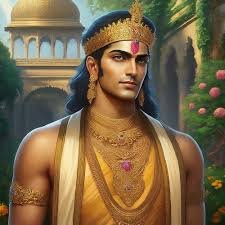Yudhishthira is often regarded as the personification pf righteous and truthfulness. He is the eldest among his brothers. Yudhishthira is regarded as dharmaraja.Yudhishthira’s commitment to truth and justice is unflinching, making him a moral light in the Mahabharata. However, his path is not without its hurdles and moral dilemmas that test his principles.
The Virtuous King – Yudhishthira

Born to Kunti and the god of dharma, Yudhishthira epitomized honesty, humility, and compassion. As the rightful heir to the Hastinapura throne, he was guided by a strong sense of duty and fairness. His choice is decided by simple principles of dharma even when they might lead to ultimate personal loss.
The truthfulness of the truthful king Yudhishthira gains him respect from friends and foes alike. Such a refusal to lie, even in the darkest of times, defines his characteristic righteousness. This characteristic, though, leaves him at the mercy of manipulators, as witnessed in the dice game designed by Shakuni and Duryodhana.
The Dice Game: The Character Test
The game of dice marks a turning point in Yudhishthira’s life. Even though he is wise, he succumbs to the temptation of gambling and loses his kingdom, his wealth, his brothers, and even Draupadi. His strict adherence to the rules of the game, even when they are unjust, reflects his deep respect for dharma. But it also exposes the limits of rigid morality in a world rife with deceit and treachery.
Yudhishthira’s role in this episode calls for condemnation and self-reflection. Could he have made things otherwise so that Draupadi was not humiliated and his family did not suffer? The gamblers remind one of the subtleties of dharma and the human frailties which lead to its being defeated.
Yudhishthira’s Leadership in the Kurukshetra War
Yudhishthira’s role as a leader comes to be tested during the Kurukshetra war. Though he detests bloodshed, he performs his warrior’s duty to retrieve justice and reinstate dharma. The moral conflicts he undergoes are obvious in many situations of war where he has to compromise his strategic decisions for the sake of his ethical sense.
A telling scene is that of Yudhishthira announcing before Dronacharya that Ashwatthama has indeed been killed. Technically correct, the words are full of deceit and lie heavy on the heart of Yudhishthira. This is the kind of victory that even the most ethical of people must pay the price for in terms of what they have to do and say.
The Ascent to Heaven
After the war, the journey of Yudhishthira continues, and he remains a beacon of dharma. This is because Mahaprasthanika Parva describes his pilgrimage towards the Himalayas, where he is tested once more. With a dog as his companion, dharma, Yudhishthira’s loyalty and sympathy ensured his ascension into heaven.
His refusal to give up the dog, even when allowed into heaven, shows that he is steadfast in his adherence to righteousness. Yudhishthira’s ascension is the triumph of virtue over earthly attachments and selfish desires.
Yudhishthira’s Legacy
Yudhishthira’s life represents a great quest into the realm of morality and a human attempt to maintain truthfulness in an uncertain world because His consistency with dharma, though challenged and compromised throughout, has made him one of the timeless figures in inspiration.
As the king who never lied, Yudhishthira teaches us the importance of integrity, humility, and resilience. His story reminds us that while the path of righteousness may be fraught with obstacles, it ultimately leads to spiritual fulfillment and eternal peace.

